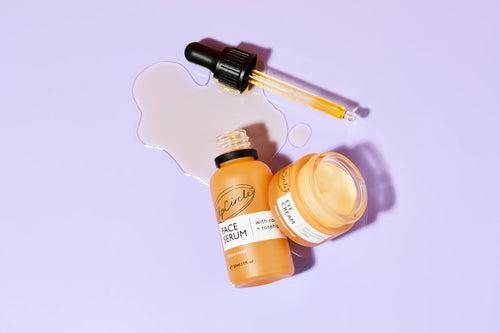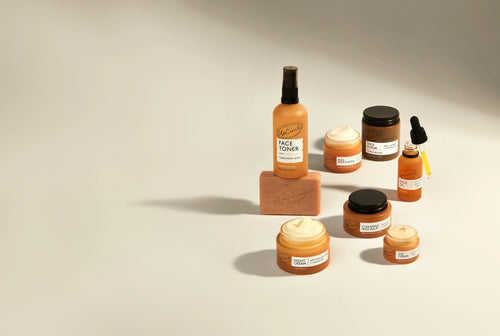While peptides have long been studied, only in recent years have the benefits of peptides for skin made the headlines. What’s more, using natural peptides in skincare products is on the rise, as people become more conscious of their environmental impact and how synthetic ingredients can impact the skin.
Are peptides just a fad or are they here to stay? We explore all you need to know about peptides for skin and whether they’re worth incorporating into your routine.
What are peptides in skincare?
Peptides are strings of amino acids which occur naturally in the body and act as the building blocks for proteins such as collagen. These proteins, including keratin and elastin, play a significant role in keeping your skin healthy and happy.
Sometimes known as polypeptides, peptides have become a key ingredient in many types of skincare products, such as serums and creams. There are several different types of peptides which all perform different actions, including:
- Signal peptides: carries information for protein secretion.
- Carrier peptides: carries specific ingredients.
- Neurotransmitter peptides: can function as either hormones or neurotransmitters to carry messages to other cells.
The amount of peptides in our bodies naturally decrease as we age, so using peptide-rich skincare products can help to give the skin the boost it needs to produce essential proteins. Peptides are often found alongside active ingredients, such as hyaluronic acid and niacinamide to target specific concerns like dry, dull and dehydrated skin.
Natural peptides for skin
Typically, peptides in skincare are synthetically produced to mimic the peptides that are found naturally in the body. However, while these peptides mimic the natural amino acid chains, they are still synthetic.
At UpCircle, we firmly believe that using natural ingredients in skincare is the best way to achieve healthy glowing skin. That’s why we use organic and natural ingredients that are rich in natural peptides, rather than using synthetic peptides to boost the skin benefits of our products.
Rosehip oil for skin
Rosehip oil is rich in natural peptides and essential fatty acids such as linolenic and linoleic acids. Known for aiding collagen production and providing excellent hydration to the skin, rosehip oil is a key ingredient in several of our best-selling skincare products.
- Organic Face Oil with Coffee Oil – formulated with caffeine-rich coffee oil to help fade hyperpigmentation and rosehip oil to leave skin plump and hydrated.
- Night Cream with Hyaluronic Acid and Niacinamide – formulated with niacinamide to replenish the skin’s natural barrier and rosehip oil to hydrate the skin and promote skin regeneration.
- Coffee Face Scrub Floral Blend for Sensitive Skin – formulated with upcycled antioxidant-rich Arabica coffee grounds and rosehip oil to deeply nourish the skin.
Hibiscus oil for skin
Aside from being wonderfully scented, hibiscus oil is a source of natural peptides which helps to stimulate elastin production in the skin. This is especially important to help the skin maintain its ‘stretch’ and elasticity, which naturally diminishes as we age.
You can find peptide-rich hibiscus in our Vegan Hand Cream, a sumptuously moisturising cream which is fast-absorbing and non-greasy. We wanted to create a nourishing natural hand cream that really works to not only moisturize your hands, but also help protect them from daily damage and wear and tear.
Sunflower oil for skin
Another great source of natural peptides is sunflower oil – sometimes known as Helianthus Annuus oil. Containing the fatty acids linoleic acid and oleic acid, sunflower oil helps to hold together the skin cells and protect them from stressors in the environment.
- Cleansers – both our Cleansing Face Balm and Cleansing Face Milk are formulated with the deeply rich source of natural peptides, sunflower oil, in order to provide intense hydration while gently removing makeup and impurities.
- Face masks – our Kaolin Clay Face Mask is rich in non-comedogenic sunflower oil which helps to repair the skin’s natural barrier.
- Moisturizers – because peptides help to boost collagen production in the skin, sunflower oil is a key ingredient in several of our moisturizers: our Eye Cream with Hyaluronic Acid and Coffee, the award-winning Face Moisturizer with Vitamin E, plastic negative Night Cream with Hyaluronic Acid and Niacinamide and fan-favorite Organic Face Oil.
3 benefits of peptides
There’s a reason why peptides are included in so many skincare products. Peptides provide the skin with a whole host of benefits that help to keep it healthy and protected from the environmental stressors we face each day.
We’ve rounded up some of the main benefits of peptides for skin:
1. Helps to repair your natural skin barrier
We’re understanding more and more about the skin’s natural barrier and how it functions to keep your skin hydrated and moisturized, while preventing toxins from damaging the skin.
Studies have found that antimicrobial peptides help to restore the tight junctions present in the skin barrier. A healthy skin barrier is a non-negotiable for healthy, glowing skin and peptides are an ingredient that can help to both maintain and repair the skin barrier.
2. Stimulates collagen production
Peptides are the essential building blocks for the protein collagen, which helps to keep your skin moisturized, healthy and supple. Collagen is important for maintaining the structure of your skin cells and also the texture of your skin.
3. Promotes skin elasticity
A sometimes overlooked benefit of peptides for skin is that, as well as supporting the production of collagen, they also promote the production of elastin. This is a highly elastic protein that is found in the skin, and helps to keep skin firm.
Peptides vs retinol: what’s the difference?
Both retinol and peptides help to promote skin turnover and collagen production, but retinol is typically harsher on the skin than peptides.
Retinol penetrates the stratum corneum (outermost layer of the skin) and also slightly into the dermis (middle layer of skin); some people using retinol products find that they are too irritating on their skin, especially if they have active breakouts. Peptides are considered to be more moisturising than retinol, and also less harsh on the skin – particularly sensitive skin.
Can you use peptides with retinol?
Yes, you can use peptides with retinol. However, some people find this to be too harsh and irritating on the skin. To combat this, we’d recommend incorporating products infused with natural retinol alternatives and peptide-rich ingredients in your skincare routine.
Can you use peptides with vitamin C?
Yes, you can use peptides and vitamin C together as peptides work well with other active ingredients. Benefit from increased collagen production and skin barrier repair from peptides and brighter, more hydrated skin from vitamin C.
Browse our full range of vegan and natural skincare at UpCircle and build a cruelty-free skincare routine.








